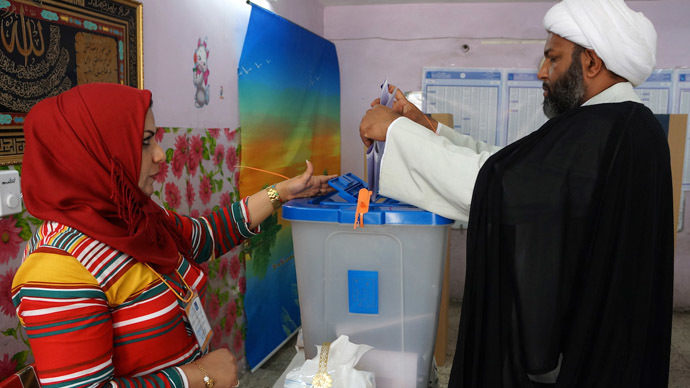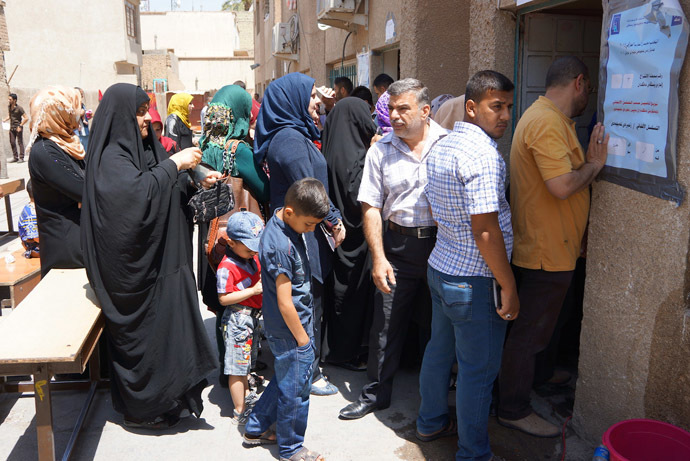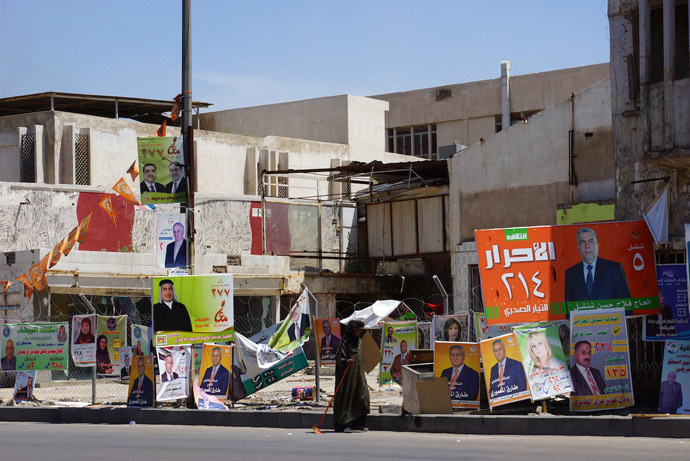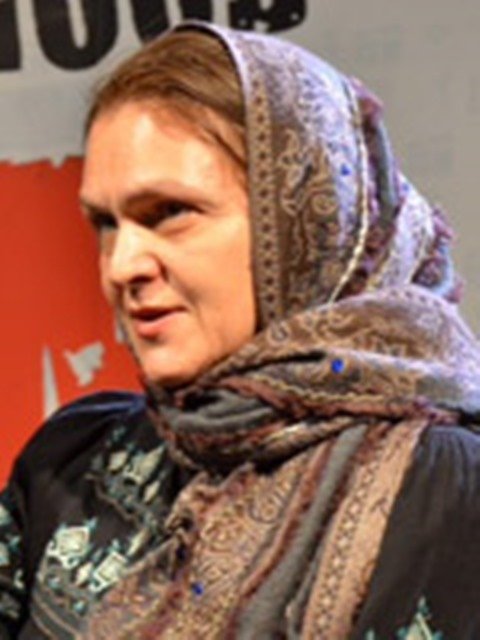Iraqi elections: 'Most corrupted one will be the winner'

The one who stole more Iraqi money is in a position to use the election and probably he will win, Muhavad Husam al Dine Al Bayati, Head of the Prime Minister office, told RT’s Nadezhda Kevorkova.
RT: Who will be the winner in the parliamentary elections?
Muhavad Husam al Dine Al Bayati: The most corrupted one will be the winner. I do not know who exactly will win. But I can judge that the one who stole more Iraqi money is in position to use the election and probably he will win. And the one who controls the army and the power will win.
RT: So if the block of the prime minister will win he will be such a person?
On April 30 Iraq is holding its first parliamentary elections since the withdrawal of US troops. Sectarian tension in the country is extremely high, while Iraq itself is a fragmented state, and it affects the ongoing voting. Though security was increased significantly, two days before the elections were overshadowed by a wave of deadly attacks.
MB: As you know the corruption in this country is very huge. And there is a lot of money in the hands of some politicians not necessary only from the block of prime minister. There are so many other blocks that stole so much money from the country. They can buy votes and support from IHEC [the Independent High Electoral Commission which approved the voting system and the counting method for 2014 parliamentary elections]. The results will not be very clear.
We do not have foreign observers or people who are watching the elections.
RT: People say that 65 American observers came to Iraq especially for the elections, is it so?
MB: What can these 65 do? Can they work on the street? Can they go to the governorates? Can they go to the election boxes and see how people vote and how their votes are counted? No, they cannot.

RT: What does it mean, this absence of interest to the first Iraqi elections? Does it mean that the US wants to change Iraqi authorities once more?
MB: We cannot be sure.
RT: What will happen after the elections? Will the tension and frequency of terroristic attacks start to grow or not?
MB: I think there will be a new government; there will be new leaders who will be able to start reconciliation in the country and forget about the past, forget about the revenge going on now in this country which we can’t stand. We need some leaders in the cabinet and in the Parliament who can start real reconciliation. Also there must be real reorganization of the army to contain all Iraqis but not only one sect as it is now. And also we need the reorganization that is related to the economy of the country, so that we can make our economy effective and promote other sectors apart from oil to provide income for the country. Then the economic situation will change. Now we are depending only on oil. And if other sectors do not participate in the economy, this country can collapse. Over 92% of the income of Iraq comes from oil. In 70-80s around 35% of its income came from agriculture. So we are a one-sided economy now. This should not continue.
RT: Why are people in Iraq saying that during the American presence the situation was better than now?

MB: Because people are getting harder. They lost their homes. When people lose their homes they go to be extremists. You know they tried to talk to 6 governorates one year in a civilized and peaceful way, but they didn’t pay any attention to them. So they went to be extremists. They used their arms instead of acting in a peaceful way (the demolishing of Iraqi refugees camps in Anbar province in Dec 2013 – RT). This is complicating the situation. Plus there is no real balance in the government organization among the different sects. This made an impression on the Sunnis that they are oppressed and neglected. The distance between al Maliki and the Sunni community became too big. There is no communication and detention started from that.
RT: Iraqi Christians are running away from Iraq, nobody knows the percentage of Christians in the country now, but some experts think that it is less than a tenth of this community in the past, is it so and is it only one-way ticket for them?
MB: Even more Sunnis are leaving the country than Christians. I cannot see Iraq without Christians. Iraq was the best place for Christians in the region before the American war. They were treated as real Iraqis. Now because of the terrorist activity, security and neglect by the government they left their homes, but I am sure that when the security is improved all the Iraqis will come back including the Sunnis. I know how much they love Iraq, especially the Christians. Even the Jewish people that left the country – all people who remember the bread of Iraq they never can forget it and they want to come back to see the place where they were born. Now it is a sectarian government, but when it will be civilized government all people will come back.

RT: What is the role of Iran?
MB: Iran is one who brought this government in – Maliki’s government. It has huge influence. Their influence here is much stronger than even the American one.
RT: If so who supports terrorists in Iraq if the role of Iran is so big?
MB: The support is coming from all over the world, from independent people, probably some organizations but not the governments.
Nadezda Kevorkova, Baghdad
The statements, views and opinions expressed in this column are solely those of the author and do not necessarily represent those of RT.
The statements, views and opinions expressed in this column are solely those of the author and do not necessarily represent those of RT.













